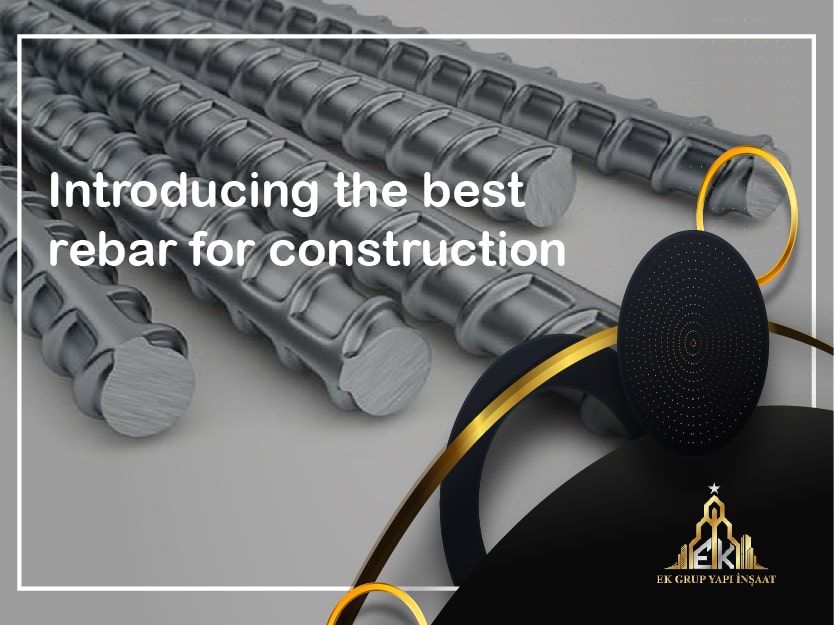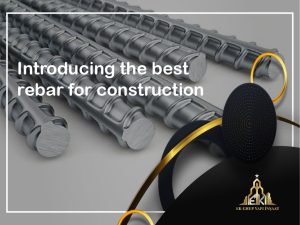Rebar is one of the most important construction materials that plays a vital role in reinforcing concrete and increasing the strength of structures. Choosing the right rebar can have a great impact on the strength, cost, quality, and durability of a building. In this article, we will introduce the best rebars suitable for construction, their characteristics, types of rebar, and factors affecting the selection of rebar.
What is rebar?
Rebar is a type of steel alloy that is made in a cylindrical shape and is used inside concrete to strengthen it. Concrete is resistant to pressure, but weak against tension. For this reason, rebar is essential in construction to deal with tensile stresses and increase the strength of structures. Rebars are usually made of high-strength steel to improve the tensile strength of concrete.
Types of Rebar
Rebars are produced in different types, each with its own characteristics and applications. Choosing the right type of rebar depends on the project needs, environmental conditions, and the type of loads that the structure must withstand. Next, we will examine the most important types of rebar used in construction and civil engineering projects.
Mild Steel
Mild Steel, also known as coiled rebar, has a smooth surface. This rebar is mostly used for applications that do not require physical connection with concrete and are used for tensile strength. This type of rebar is less used in construction and is mostly used in non-construction industries.
Deformed Bar
Reformed rebar is the most common type of rebar in construction. This rebar has a raised surface that makes it adhere better to concrete and therefore increases the strength of the structure. Reformed rebar is divided into two types:
- Reformed rebar with spiral ribs: This rebar has higher tensile strength and is suitable for projects requiring greater strength.
- Ribbed rebar with cross ribs: These rebars are mostly used in projects requiring less resistance.
Galvanized rebar
Galvanized rebar is a type of ribbed rebar that is coated with a layer of zinc metal to make it more resistant to corrosion. This rebar is very suitable for humid environments or areas with harsh weather conditions and high humidity.
Composite rebar (Fiber-Reinforced Rebar)
Composite rebar is made from a combination of polymer materials, glass, or various fibers. This type of rebar is used in projects that require light weight and greater resistance to corrosion. For corrosive environments such as coastal areas, this type of rebar is a suitable option.
Types of rebar in terms of standards
Rebars are typically produced according to different standards. The most common standards are:
A1, A2 and A3 rebar
These rebars are classified according to different standards:
- A1 soft rebar, suitable for general projects with lower tensile strength.
- A2 medium-strength rebar, used in light and medium-heavy projects.
- A3 high-strength rebar, suitable for heavy projects and building reinforcement.
A4 rebar
A4 rebars are usually used for projects that require high resistance to corrosion and harsh environmental conditions. These rebars are used in humid or coastal environments.
A5 rebar (stainless steel rebar)
These rebars are used in projects that are exposed to corrosive and moisture conditions. A5 rebars have high corrosion resistance and are suitable for coastal or humid areas.
Factors affecting the selection of the best rebar
To select the right rebar for construction, several factors must be considered. These factors not only affect the quality of the structure, but also its costs, durability and safety.
Tensile strength of rebar
The tensile strength of rebar is one of the most important characteristics. Rebars with higher tensile strength are able to withstand greater loads, thereby increasing the strength of the structure.
Standards and certifications
One of the important points in selecting rebar is to pay attention to national and international standards. Rebars that have valid standards such as ISO or ISIRI are usually of higher quality.
Thickness and diameter of rebar
The thickness and diameter of the rebar are also factors that must be considered. For projects with higher loads, it is necessary to use rebars with larger diameters and thicknesses.
Corrosion resistance
In areas with high humidity or exposed to harsh weather conditions, rebars with high corrosion resistance are a better choice. Galvanized and coated rebars are more suitable for these conditions.
Cost of Rebar
The cost of rebar is another important factor in selection. High-quality rebar may cost more, but in the long run, it will reduce repair and maintenance costs.
Best Rebars for Construction
Depending on the project characteristics and environmental conditions, some of the best rebars for construction include: Choosing the right rebar depends on the type of structure, weather conditions, and loading. For heavy projects or structures exposed to high tensile stresses, high-strength rebars such as A3 or galvanized rebars that have high corrosion resistance are suitable options. In projects located in humid or coastal areas, stainless steel rebars (A5) or composite rebars will be the best choice to ensure the durability of the structure against corrosive conditions.
A3 Rebar
A3 rebars are the best options for construction projects due to their high tensile strength and strength. These rebars are widely used in the construction of residential, commercial, industrial, and other concrete structures.
Galvanized Ribbed Rebar
Galvanized rebars are very suitable for construction projects in humid and coastal areas. These rebars have high corrosion resistance due to their zinc coating and increase the useful life of the structure.
Stainless steel rebars (A5)
A5 rebars are a good choice for projects that are exposed to corrosive or humid conditions. These rebars have high corrosion resistance and can greatly increase the life of the structure.
Summary
Choosing the right rebar depends on the environmental conditions, type of project, required strength, and budget. A3 and galvanized rebars are among the best options for construction, but in certain projects such as coastal or humid areas, stainless steel (A5) or composite rebars may be a better choice. Choosing the right rebar can have a great impact on the quality, strength, and durability of structures.
For each project, it is recommended to consult with structural engineers and specialists to select the best type of rebar to suit the needs of the project.




